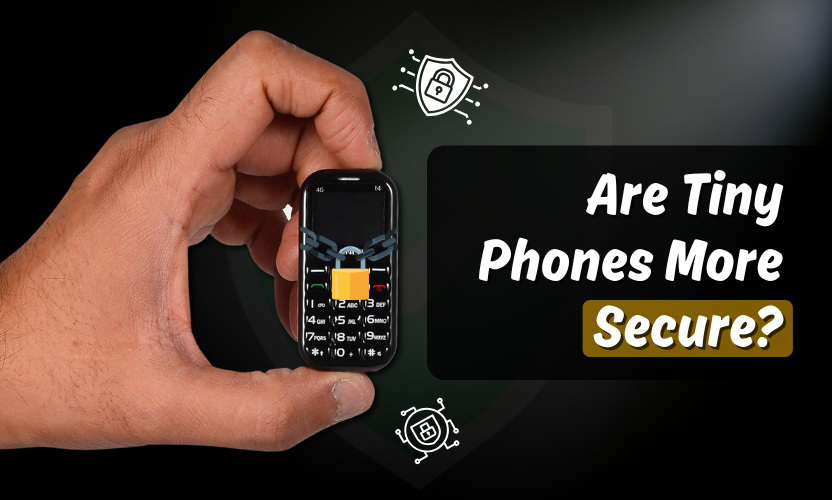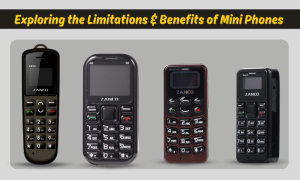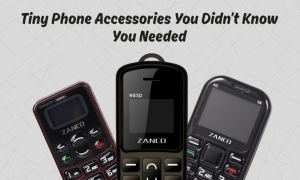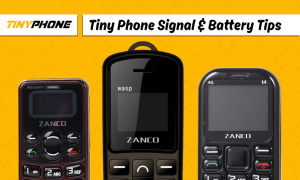
In today’s hyperconnected world, digital privacy has become one of the biggest concerns for smartphone users. Every swipe, tap, and voice command generates data that can be tracked, analyzed, and monetized. While smartphones promise convenience, they also expose users to constant surveillance, hacking attempts, and data leaks.
That’s why privacy-conscious users are turning to tiny phones minimalist devices designed to offer simplicity and safety. These compact handsets are becoming popular among those looking to reduce their digital footprint and disconnect from invasive tracking.
If you’re curious whether these small devices can actually keep your information private, you’re in the right place. In this guide, we’ll explain why tiny phones can be more secure, what trade-offs they bring, and how to choose the best one for your privacy goals.
How Smartphones Compromise Your Privacy
Smartphones have revolutionized communication, but they’ve also opened the door to mass surveillance and cyber risks.
Continuous Data Collection
Your smartphone is rarely silent. Even when you’re not using it, background apps connect to servers, syncing contacts, browsing data, and even health metrics. Studies show that apps like Facebook, Instagram, and TikTok collect far more user information than most people realize. This behavior forms part of the global data-harvesting ecosystem, where your habits are analyzed for targeted advertising.
Location Tracking
Modern devices continuously track your location using GPS, Wi-Fi triangulation, and Bluetooth beacons. Even if you disable location services, telecom networks can still locate you through cell-tower triangulation. This location data is often shared or sold, creating detailed movement profiles of millions of users.
App Permissions and Surveillance
Most apps demand permissions far beyond what they need access to your camera, microphone, or calendar allowing them to gather personal insights. Each permission adds another attack surface for potential exploitation by hackers or malicious advertisers.
What Makes Tiny Phones Different
Tiny phones flip this model entirely. They are built for privacy by limitation, meaning their lack of features is what keeps you safe.
Minimal Connectivity, Minimal Risk
Tiny phones often lack GPS, Wi-Fi, and app stores. By eliminating these connectivity options, they drastically reduce exposure to remote hacking or data-mining systems. Since there are no background apps constantly requesting data, your privacy risk remains minimal.
Simpler Operating Systems
Unlike Android or iOS, tiny phones use lightweight, closed or open-source systems that operate without complex background processes. This simplicity lowers vulnerability and prevents constant telemetry exchanges with third-party networks.
No App Store, No Third-Party Trackers
Without app stores or analytics frameworks, third-party tracking becomes virtually impossible. This design eliminates common data leaks from social media SDKs and ad networks, a major reason why privacy advocates prefer these phones.
Are Tiny Phones More Secure?
Yes in many cases, tiny phones are more secure because they minimize digital exposure. Their simplicity limits the number of vulnerabilities hackers can exploit.
Fewer Apps, Fewer Exploits
Malware often spreads through infected apps or phishing messages. Since tiny phones lack app stores and browsers, they remove the main gateways for attacks. This makes them ideal for users who value cyber-security over convenience.
No Passive Listening
Tiny phones typically don’t have voice assistants like Siri or Google Assistant listening for wake words. This prevents passive recordings and voice-profiling a growing privacy concern in the era of smart devices.
Limited GPS and Tracking
Most tiny phones either lack GPS entirely or offer manual controls. This means your real-time location isn’t constantly shared with advertising networks or stored on cloud servers.
Local Data Storage
These devices store data locally and rarely sync it to online backups, reducing the impact of breaches. Even if stolen, the attacker gains access to very little information compared to a modern smartphone.
Privacy Trade-Offs to Consider
While tiny phones excel in limiting exposure, they come with certain trade-offs worth considering.
Limited Encryption Tools
Most compact devices do not support end-to-end encrypted messaging apps like Signal or Proton Mail. Although they minimize tracking, your calls and texts may still flow through standard, unencrypted channels.
Trackable Through Cell Towers
Even the simplest phone connects to cell towers, making cellular triangulation possible. This means you can still be located approximately based on your network connection.
Lack of Regular Security Updates
Smartphones receive frequent security patches. Tiny phones, however, often go years without updates, leaving potential vulnerabilities unaddressed. That said, their reduced complexity still makes them harder targets for most cyber-attacks.
Convenience vs. Control
Tiny phones sacrifice comfort for control. You lose modern conveniences such as digital maps, social media, and instant messaging. Yet, for those who prioritize privacy, the trade-off is often worth it.
Best Privacy-Focused Tiny Phones in 2025
If you’re ready to downsize your digital life, here are a few models known for their privacy-centric design.
Light Phone II
A sleek minimalist device with no social media apps, no browser, and no background tracking. Ideal for professionals seeking peace of mind while staying reachable.
Zano ant phone
This phone supports Signal encryption, allowing secure text and call communication. Built with a proprietary OS, it avoids unnecessary data sharing and cloud synchronization.
Nokia 105
A retro classic offering only core features such as calls and texts. While it’s not fully privacy-optimized, it’s an affordable choice for reducing your online footprint. Looking for more options? Check out our breakdown of the best small phones for privacy-minded users.
Security Tips for Tiny and Smart Phone Users
Whether you use a smartphone or a minimalist device, your security depends on how you use it. Follow these best practices to keep your personal data safe:
- Turn off Wi-Fi, Bluetooth, and GPS when not needed.
- Use a strong PIN or biometric lock.
- Disable cloud backups and store data offline.
- Restart your phone regularly to remove temporary malware.
- Avoid clicking unknown links in messages.
- Use a VPN when accessing the internet (if available).
- Keep personal and work devices separate.
For more guidance on maintaining long-term device health, visit our post on 5 proven ways to make your phone battery last longer.
Simplicity Is the New Security
Tiny phones redefine digital safety through simplicity. By stripping away non-essential features, they close off most of the vulnerabilities that plague modern smartphones. They aren’t completely anonymous, but they provide a substantial privacy upgrade for users tired of being tracked.
If you value control over convenience, switching to a tiny phone could be your best move in 2025. For journalists, minimalists, and privacy advocates, these pocket-sized devices prove that less really can be more. To learn more about privacy-friendly devices and accessories, explore our Refurbished Phones Collection, a smart way to stay secure while saving money.
Most tiny phones either lack GPS completely or allow you to disable it manually, greatly reducing the chance of location tracking.
Yes. Their small operating systems and lack of app stores minimize the entry points hackers can exploit.
Some models like the Punkt MP02 support Signal for encrypted communication, but most basic models do not offer encryption apps.
They reduce your digital visibility, but they cannot fully prevent network-level tracking such as cell-tower triangulation.
They’re ideal for calling, texting, and light communication, but not suitable for heavy app users or those who rely on mobile internet.




